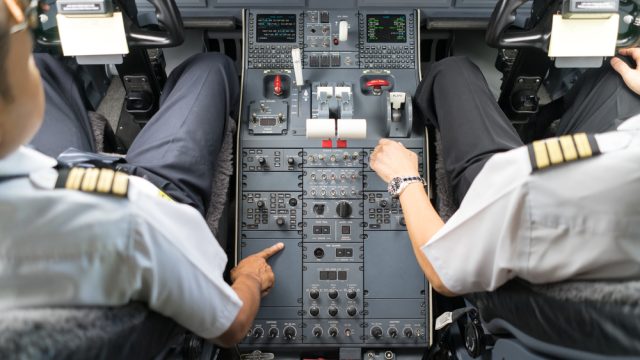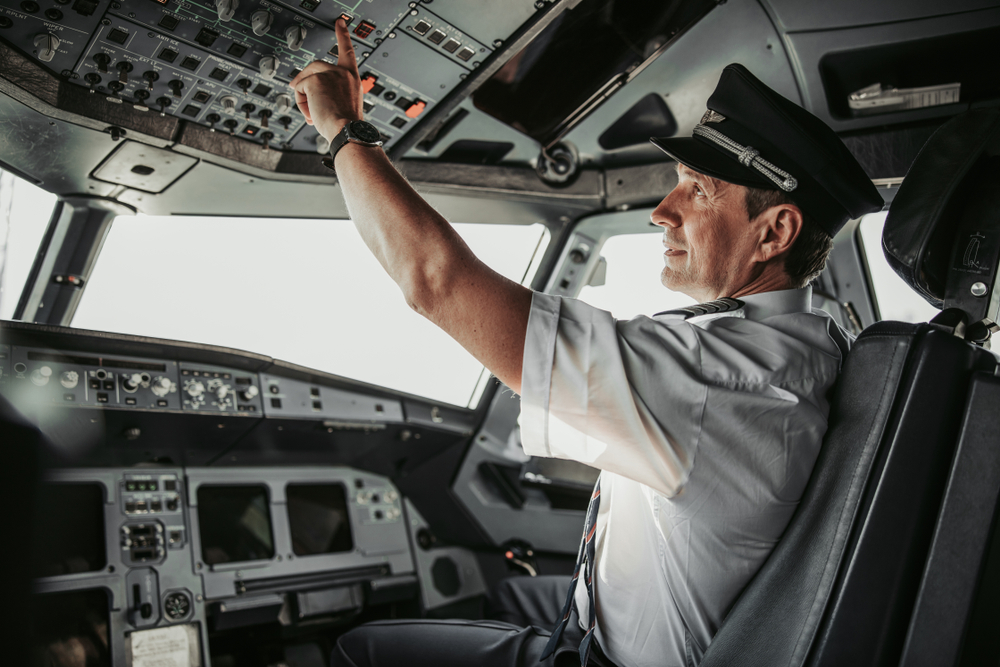If You Hear These 7 Words on a Flight, an Engine Has Failed, Pilot Says

Getting some kind of message directly from the pilot is something you can expect on practically every flight. Whether they’re just giving you an update on your arrival time or letting you know there may be some turbulence ahead, usually the worst that comes from most announcements is a brief interruption to the movie or show you’re watching. But if you ever hear a pilot use one phrase in an update, what they really mean is that an engine on your plane has failed. Read on to see what terminology captains use in this type of situation.
RELATED: This Is the Worst Place to Sit on a Plane, Flight Experts Say.
A pilot might say “one of our engines is indicating improperly” when an engine has failed.

Apart from letting you know when you’ve reached cruising altitude or calling out points of interest below, pilots generally keep passengers up to date on their flight in order to explain any changes in arrival time. However, in the rare case something goes wrong with the plane, they’ve also adopted euphemisms and manners of speaking that won’t cause panic in the cabin. So if you ever hear a pilot announce that “one of our engines is indicating improperly,” what they actually mean is that an engine on the plane has failed.
Fortunately, having an engine cut out on a flight is not usually a major cause for alarm.

While the idea of losing an engine mid-flight may sound like a terrifying situation, it’s surprisingly not much of a cause for concern or even a significant emergency in many cases. Commercial pilots train for hours on handling aircraft that have suffered engine failure. It’s considered such a textbook problem that they may not even announce it at all, if only to avoid scaring passengers, according to Lifehacker. At most, pilots may divert the flight to make an unscheduled landing at another airport, but they will sometimes even carry on with the flight as scheduled if it makes sense to do so.
This does not mean the plane can’t stay aloft: If one engine is lost mid-flight, the other engine (or others) can keep it going because of the redundancy safety features built into planes as part of their design. The only difference is that the aircraft loses thrust, meaning it can’t fly at its maximum altitude. It also reduces the fuel efficiency and range of the plane as the other engine or engines pick up the slack. However, passengers may not even know the mechanical issue has happened.
RELATED: For more up-to-date information, sign up for our daily newsletter.
Engine failures are also exceedingly rare in the sky and seldom lead to fatal injuries.

Even if being in the capable hands of a well-trained pilot isn’t calming your flight jitters, it might also help to know that engine failure is exceedingly rare. International safety statistics show that only about 25 incidents of jet engines failing while mid-flight or on the ground are reported annually—meaning less than one for every million flights globally, CBS News reports.
There are other subtle audible clues that there could be an emergency on your flight.

An announcement from your captain might not be the only red flag that something is wrong on your flight. In a TikTok video posted Nov. 14 that has been viewed more than 12 million times, flight attendant Tommy Cimato informed passengers about the high-low chime sounds you hear on flights. According to Cimato, three of these chime sounds could be a sign that there’s trouble. “If you hear three of those [sounds], it means it’s an emergency,” he warned, but also added that it’s unlikely you’ll ever hear three chimes in a row on one of your flights.
Hearing triple chimes could indicate different types of issues, many of which might be less problematic for you. For example, John Cox, a flight captain, told USA Today in 2012 that three or more chimes have also been used before to warn flight attendants to sit immediately when pilots have just received sudden reports of turbulence.
Besides that, Cox also says that three chimes could be a signal to the flight deck that there is a passenger with a medical problem that might require a diversion of the plane as well. “I would not automatically draw the conclusion that more chimes indicate a serious problem,” he said.
RELATED: Never Forget to Do This After Takeoff, Flight Attendant Warns.